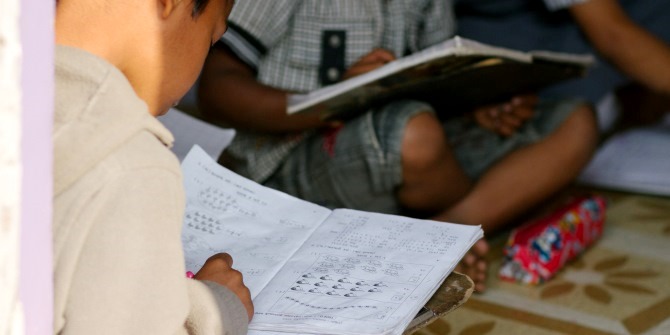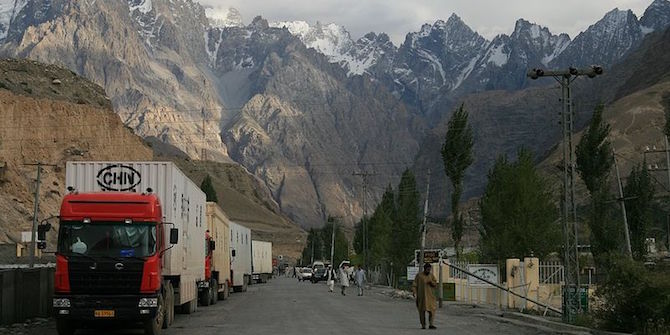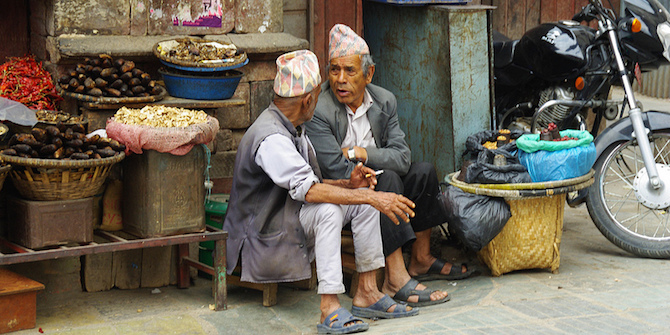
Many women who were displaced during the People’s War have sought employment in Nepal’s entertainment sector due to vulnerabilities created by the conflict. Punam Yadav brings attention to these forgotten survivors and questions the role of the WPS agenda in addressing their needs.
Although the Women, Peace and Security (WPS) agenda has grown to include the issues and concerns of women, men and children impacted by different types of wars, the focus remains on certain types of people and certain categories of ‘victim’. One example of the forgotten victims of the People’s War in Nepal is the internally displaced women who turned to employment in cabin restaurants and dance bars for their safety and survival. During the ten years of the People’s War (1996-2006), around 200,000 people were forced to flee their homes, and according to the Internal Displacement Monitoring Centre, most of them were women and children. There were various reasons for their displacement. Some people displaced due to the threat from the security forces and others displaced because of the Maoists. Moreover, family members of the Maoists and security forces, such as the wives, mothers, sisters and children had to displace due to the fear from both sides.
Nepal did not have an internally displaced persons (IDP) policy until 2007. The situation was extremely difficult for people fleeing their homes, as they were hiding from both sides with no protection from the government. There was no IDP camp as such. Displaced people stayed with their relatives, in rented flats or in a single room, whatever they could afford, and others stayed in slums. It was risky to carry any identification documents, especially for those who were coming from the Maoist controlled areas. Due to the fear of being caught or harassed by the security forces, they did not bring any paper work with them. There were checkpoints every few kilometres where people had to get off the bus and walk for around 1 to 2 km.
People who fled their villages ended up in a city where they had to find work to survive. Most of these displaced women and girls were from rural and remote villages with low literacy and even those who had some level of education were limited in their choices couldn’t find a decent job because they did not have any documents with them. They ended up in places where they would never have worked if there was no conflict.

Image Credit: Blemished Paradise [CC BY-SA 2.0], via Flickr
Although most businesses were in decline due to the conflict, the entertainment sector was booming in Kathmandu, especially the cabin restaurants and dance bars which were popular among businessmen, workers and drivers. I spoke to Geeta, who was displaced during the war, and she shared her story of how she ended up in dance bar: It was dangerous for us to stay in the village, especially for young girls like me. I was only 14 years old when I left my village. If I stayed there, I had to join the Maoist or else they would kill me. If I joined them, police would torture and harass my family. So I had no choice but to flee. I came to Kathmandu. I was looking for a job but I did not have any paperwork. I was also scared of being caught by the Maoist so I thought the dance bar was the safest place where I could work as well as hide myself. They did not ask for any paperwork so I started working in a dance bar.
Sharing what she went through, she added:
Verbal abuse is normal for us as we get that every day. They (the clients) even touch our body. If we defend or say no, we may lose our jobs.
There is no exact record of how many women are in the entertainment sector. However, an estimated 50 to 100 thousand women work in the entertainment sector in Kathmandu, including those working in cabin restaurants and dance bars, out of which at least 40% are IDP women. Geeta questions these figures, given how unstable jobs are. Workers move very frequently. Contracts are not usually given. Women leave quickly due to harassment, threats and fear of being caught by family members.
Since 2006, I have spoken to several women who were displaced during the war and now work in such restaurants and bars. All of these women shared similar stories. Almost all of the women I talked to said they tried to find other jobs before ending up there. They said wherever they worked, even those who worked as domestic workers or labourers in constructions sites, faced harassment and abuse. Even for those who had been displaced with their husbands, it was difficult to manage the household expenses with only one person’s income so to support the family, so they ended up working in the entertainment sector. Whatever the reasons were, they were the victims of conflict and would have never worked in such places if there was no conflict. Geeta said:
The government had turned blind eye towards these restaurants during the conflict that’s why a lot of these types of restaurants were open. However, after the Peace Agreement, the government became stricter saying that it is bad for the society, without thinking about the people, like me who were working there. They wanted to close all the business. However, after all the workers came out and protested, these restaurants were allowed to operate but with strict rules, which had impact on the business, which means a lot of us had to lose their jobs or work in very exploitative conditions.
There are several NGOs supporting women working in the entertainment sector, providing language lessons and training on how to protect themselves from harassment. Even though around 40% of these people working in the entertainment sector are there as a consequence of the conflict, this is not recognised, and they do not receive any support from the government.
Nepal developed a National Action Plan (NAP) in 2011 on United Nations Security Council Resolution 1325 (UNSCR 1325) to support victims of conflict, but the women working the entertainment sector were never included in any of the programmes.
I asked Geeta if she knew about UNSCR 1325, and the measures designed to support women in post-conflict situations. She had once been invited to a training, but said, “most of these survivors of conflict do not know about 1325. In fact, they do not even know that they are the victims of the civil war as they have never been seen as victims of war”.
Nepal is currently developing a second NAP. I would like to bring this to the attention of policymakers as well as civil society organisations in Nepal to include the needs and concerns of these women into the second NAP.
The situation of these women, displaced by conflict and with limited or no choice of where they can earn a work to survive, is not unique to Nepal. Refugees who take a similar path for the survival of themselves and their families are similarly overlooked. We need to consider the different categories of victims, and the long term impacts of war, not just the direct, immediate impacts. The women I spoke to are living in extreme conditions and being sexually abused almost every day. Do we have the responsibility to protect their rights? Does it fall under the WPS agenda? We all need to pause and ask these questions of ourselves and of the Women, Peace and Security agenda.
This article gives the views of the author, and not the position of the South Asia @ LSE blog, nor of the London School of Economics. Please read our comments policy before posting.
This post originally appeared on the LSE Women, Peace and Security blog on September 28th 2017.
About the Author
 Punam Yadav is a Teaching Fellow in the Gender Institute and Research Fellow in the Centre for Women, Peace and Security at LSE. She is the author of the book ‘Social Transformation in Post Conflict Nepal: A gender perspective’ and recently published a chapter in ‘Women in Governing Institutions in South Asia’. She is interested in examining the gendered impacts of war on women and girls.
Punam Yadav is a Teaching Fellow in the Gender Institute and Research Fellow in the Centre for Women, Peace and Security at LSE. She is the author of the book ‘Social Transformation in Post Conflict Nepal: A gender perspective’ and recently published a chapter in ‘Women in Governing Institutions in South Asia’. She is interested in examining the gendered impacts of war on women and girls.







